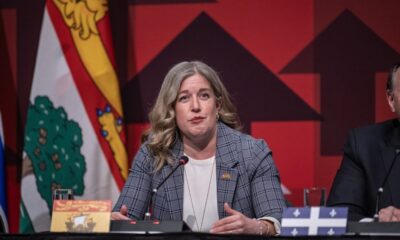Education
New Brunswick Delays School Lunch Program Despite Election Promises

The New Brunswick government has confirmed that a planned pay-what-you-can school lunch program will not be implemented this fall, despite a commitment made by the Liberal Party during the election campaign. The announcement was made by Education Minister Claire Johnson, who stated that the government is still evaluating similar programs in other provinces and requires additional time for preparation.
During a press briefing on Friday, Minister Johnson explained, “We’re still examining how we’re going to be rolling this out… so we need more time for that. We’re going to be rolling that one out next year, at the beginning of next school year.” This decision contradicts the earlier promise made by Liberal leader Susan Holt, who announced both a universal free breakfast program and a pay-what-you-can lunch program in September 2023, stating that both would be operational by this fall.
While the breakfast program is set to supplement existing volunteer and donation-driven initiatives, Holt emphasized the importance of carefully studying lunch programs in other regions, particularly in Prince Edward Island, where a similar initiative has been under review for over a year. “We want to get it right, and the funding will be there once all of the pieces are in place,” she remarked.
The financial implications of these programs are significant. Holt indicated last year that the free breakfast program would require an estimated $9 million, while the pay-what-you-can lunch program was projected to cost $18 million. These figures were derived from a financial analysis of the P.E.I. program and were submitted to Elections New Brunswick as part of the commitment costing requirement. Holt suggested that if an agreement for funding under a federal school food program were reached, the provincial cost could be reduced.
In March 2024, the federal government announced $11 million in funding for New Brunswick to support the breakfast program. Finance Minister René Legacy confirmed in his budget speech that the province had allocated $19 million for the lunch initiative. This has raised questions from Progressive Conservative education critic Ian Lee, who asked, “If it’s been budgeted, where does it go?” He noted that if the funding was reduced, it would reflect a troubling trend alongside cuts to child welfare spending and layoffs of school library workers.
Holt had previously articulated the rationale for these programs, citing that one in four students in New Brunswick arrives at school hungry. She described the two-meal initiative as both an affordability measure and a strategy to enhance student performance. “New Brunswick families are feeling the pinch of the rising cost of living and students need support so that they can learn,” she stated. “Imagine kids coming to school without the stress of where their next meal is going to come from.”
At the time of the announcement, Jill Van Horne, the network director of the organization Food For All New Brunswick, praised the Liberal plan as “ambitious.” She acknowledged the complexities involved in implementing school food programs, which require thorough planning in areas such as food sourcing and volunteer coordination. Despite requests for comments, no representatives from Food For All New Brunswick responded to inquiries last week.
Holt’s government had also committed to balancing the budget, arguing that the breakfast and lunch programs would remain financially feasible—even as the Progressive Conservative government had projected a small deficit. The Liberals ended the last fiscal year with a $399 million deficit and are now forecasting a deficit of $668.7 million for the current fiscal year.
As the new school year approaches, the absence of the lunch program raises concerns about the ongoing challenges faced by vulnerable families and students in New Brunswick. The government’s decision to delay the program underscores the complexities of implementing effective school food initiatives, as the province continues to navigate financial limitations and logistical hurdles.
-

 World3 months ago
World3 months agoScientists Unearth Ancient Antarctic Ice to Unlock Climate Secrets
-

 Entertainment3 months ago
Entertainment3 months agoTrump and McCormick to Announce $70 Billion Energy Investments
-

 Lifestyle3 months ago
Lifestyle3 months agoTransLink Launches Food Truck Program to Boost Revenue in Vancouver
-

 Science3 months ago
Science3 months agoFour Astronauts Return to Earth After International Space Station Mission
-

 Technology2 months ago
Technology2 months agoApple Notes Enhances Functionality with Markdown Support in macOS 26
-

 Top Stories1 week ago
Top Stories1 week agoUrgent Update: Fatal Crash on Highway 99 Claims Life of Pitt Meadows Man
-

 Sports3 months ago
Sports3 months agoSearch Underway for Missing Hunter Amid Hokkaido Bear Emergency
-

 Politics2 months ago
Politics2 months agoUkrainian Tennis Star Elina Svitolina Faces Death Threats Online
-

 Technology3 months ago
Technology3 months agoFrosthaven Launches Early Access on July 31, 2025
-

 Politics3 months ago
Politics3 months agoCarney Engages First Nations Leaders at Development Law Summit
-

 Entertainment3 months ago
Entertainment3 months agoCalgary Theatre Troupe Revives Magic at Winnipeg Fringe Festival
-

 Politics1 week ago
Politics1 week agoShutdown Reflects Democratic Struggles Amid Economic Concerns





















